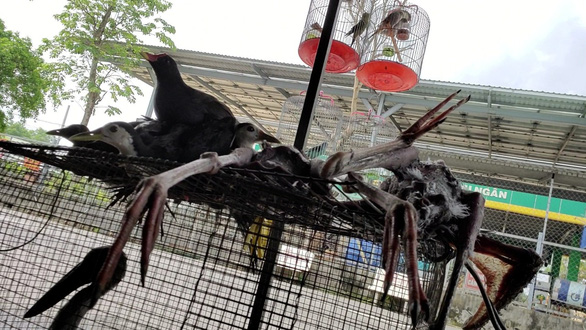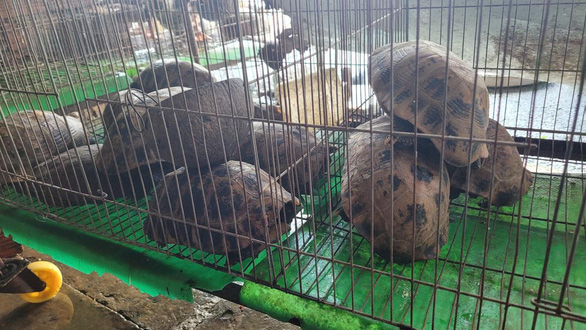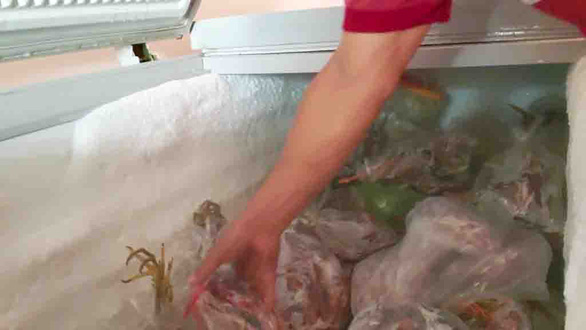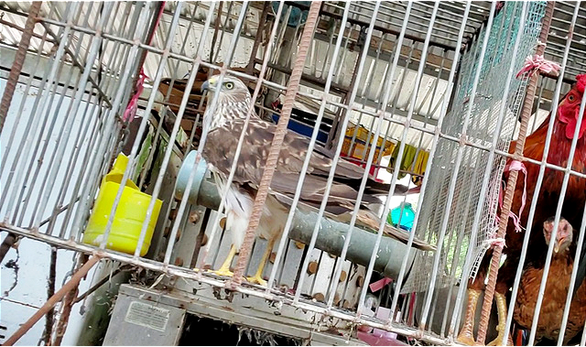Tam Nong Market in Tram Chim Town, Dong Thap Province used to be a hotbed of wildlife trafficking in southern Vietnam.
Nowadays, however, the flood of endangered wildlife flowing into local markets from nearby Tram Chim National Park and Cambodia seems to have slowed, but across the region traffickers still breed and butcher rare animals.
Any animal in demand
Though the wildlife trade in Dong Thap is not what it once was, some vendors at Tam Nong Market still deal in rare animals.
Tam is one of these vendors.
Keeping a watchful eye of the turtles for sale at her stall, she agreed to deliver a large shipment of endangered turtles to an undercover reporter, provided that they would be set free at pagodas.
Tai, a vendor at the market who primarily deals in both live and frozen copperheads and banded kraits, claims himself as the biggest wildlife seller in Tam Nong.
|
|
| Turtles up for sale at the Thanh Hoa bird market in Long An Province, southern Vietnam. Photo: Tam Le / Tuoi Tre |
When undercover reporters asked what other animals Tai had access to, he gladly led them to his home where three freezers filled with animal parts awaited.
“The stork and night heron meat is fresh and newly-slaughtered,” he claimed.
“I have sold them to restaurants in Saigon and Binh Duong, and even sent them by air to Hai Phong [in the north].
"I pay delivery costs.”
According to Tai, most of the animals he sells are hunted in paddy fields and at Tram Chim National Park during flooding seasons.
The conversation between Tai and the undercover reporters of Tuoi Tre (Youth) newspaper was cut short when a woman, his wife, came rushing into the room.
“There is nothing to sell here, you should leave,” she said, pushing the reporters out the door.
'Banned goods are kept in freezers'
About 20 kilometers from Tram Chim Town sits Tan Cong Sinh Market, where wildlife wholesalers abound.
One particular stall at the market caught the eye of undercover reporters thanks to a coterie of nets and traps displayed at its entrance.
Inside that stall sat Nhung, a middle-aged woman who claimed to have stork for sale.
“[Stork meat] is prohibited so I keep it in a freezer and don’t put it on display. I don’t want authorities to seize it and fine me,” she explained
In a dual-compartment freezer at her market stall, Nhung keeps “little egret and yellow bittern meat that is so fresh.”
Inside the freezer are 17 storks priced at VND180,000 (US$7.8) per individual.
Each weighs over a kilogram and Nhung offers discounts of VND10,000 ($0.43) to wholesalers.
When asked how she transports these endangered animals to buyers, Nhung explained that it is only difficult to send live animals.
|
|
| One of the three large freezers full of storks at Tai’s house in Tram Chim Town, Dong Thap Province, southern Vietnam. Photo: D.Qui / Tuoi Tre |
“Transporting frozen meat is much easier. I just need to put it in a Styrofoam box and seal it with tape. If police check, I can just say it is another [legal] animal,” she said.
The storks are hunted in fields and forests, according to Nhung.
The hunters only call her after they have made a kill and she cannot guarantee products to customers in advance.
In nearby Long An Province, the once bustling rare bird trade at Thanh Hoa Bird Market in Thanh Hoa District is now kept under wraps following a crackdown authorities began at the outbreak of the COVID-19 pandemic.
Approaching stall owners and claiming to be buyers in search of turtles to set free at pagodas in Ho Chi Minh City, Tuoi Tre’s undercover reporters were welcomed by sellers there.
“Turtles are available,” Oanh, a bird vendor said while leading the reporters to the back of her house.
Oanh then disappeared into a backroom and appeared a few minutes later with a bag of 15 medium-sized Mekong snail-eating turtles and an elongated tortoise.
“Yellow turtles are priced at VND500,000 [$21.5] per kilogram; elongated tortoise, VND400,000 [$17.2]; and the rest cost VND350,000 [$15.1]," Oanh said.
“The price is quite high because these turtles are hard to find during this season.
"Next season, it will become cheaper.”
At another stand, no turtles were on display but the owner led the reporters to a backroom where she opened a box with two turtles inside.
“The transport [of turtles] is currently difficult because forest rangers in civilian clothes often sit in front of the market, but I can still have the reptiles delivered to any bus station you want,” the owner’s husband said as he was handing his business card over to the reporters.
At another kiosk, when the undercover reporters asked to purchase barn-owls, the owner said they were not immediately available, but could easily be hunted at a cost of VND250,000 ($10.8) per owl.
About half an hour after leaving the kiosk, she called the reporters to say the barn owls were available.
The undercover reporters then visited yet another counter known as the largest bird stall at Thanh Hoa Bird Market and also for a large fine it received from local authorities for keeping a smooth coated otter.
Though the operator was wary of the undercover reporters, she immediately warmed up when asked about turtles to be set free at pagodas.
She then led the reporters to a locked door, behind which were three Mekong snail-eating turtles, four elongated tortoises, and 15 yellow-headed temple turtles, all attempting to escape the tank.
Aggressive sales tactic
At Dieu Phap Pagoda in Binh Thanh District, Ho Chi Minh City, five stores specialize in the sale of wild animals.
These stores, in particular, are notorious as their owners are not afraid to swear at, threaten, or beat customers with whom they disagree.
|
|
| A Malaysian hawk is up for sale at Tan Hung Market in Long An Province, southern Vietnam. Photo: D.Qui / Tuoi Tre |
Trung, the owner of a bird store at the pagoda, shared, “[My store] has turtles, but we must hide them because authorities often patrol this area.”
Inside Trung’s shop was a box with 1.5-kilogram Mekong snail-eating turtles.
The turtles’ shells bear bad luck, he claimed.
A woman near Trung’s shop then showed the undercover reporters a box of ornamental turtles priced at VND90,000 ($3.9) each.
When being asked about larger reptiles, the woman said she did not have any, though another compartment inside the same box held two elongated tortoises.
“How much are these elongated tortoises?” the reporters asked.
“They are very expensive; can you afford them?” she said, adding that they cost VND1.1 million ($47.3) each.
Animals hidden in plastic bags
There are ten bird stores on the street leading from the Xang Bridge to Tinh Quang Pagoda in Cu Chi District, Ho Chi Minh City.
Some of these stores keep rare turtles on display and the shopkeepers enthusiastically wave to customers.
Others discreetly observe customers before conducting transactions.
Be, the owner of a store specializing in birds, yellow turtles, and giant Asian pond turtles, said that she is able to transport these animals around the city by keeping them in black plastic bags.
Like us on Facebook or follow us on Twitter to get the latest news about Vietnam!


















































